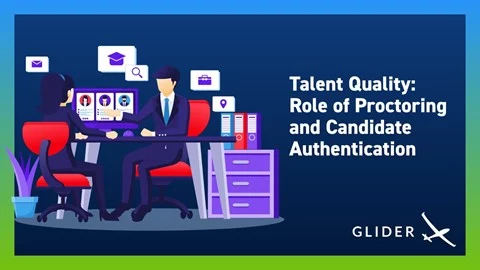The outbreak of Covid contagion has made the world embrace many changes. Apart from the disruption in personal lives, the corporate world also encountered drastic changes in all spheres of its business. Never before has the world seen so many activities transpire online, since 2019. Likewise, recruitment and proctoring systems have been garnering huge demand in academics and recruitment domains. When it comes to testing integrity, proctoring is the one-stop destination. From talent quality to candidate authentication, recruiters are harnessing the potential to its fullest.
In the knowledge-based economy, recruiters know what it takes to select a candidate who is not only talented but also has an authenticated portfolio. The gain is on both sides. While an organization gains an employee that can become a potential asset, the employee on the other hand gains numerous opportunities to demonstrate his/her skills and abilities in the organization.
Talent Quality
Is talent quality one and the same? Well, thought schools and recruiters are divided in their opinions. Microscopically, talent and quality have a minute difference. While talent refers to the exceptional skill set of a candidate like behavior, academic, technical, and others, quality refers to their ‘fit’ or job-role mapping. In this regard, it can talent quality can be said as a candidate’s mastery over his/her abilities and knowledge necessary to perform the designated work.
In the words of SIA, “Talent quality is a leading indicator of success, yet it remains a lagging indicator.”
According to an article in performancebasedhiring.com, talent quality can be measured through:
- Basic skills, experience, and education
- Job fit
- Career plan
- Cultural and managerial fit
- Problem-solving abilities
- Achievement trends and patterns
No matter what notion every organization has about talent quality, it is true that talent creates its own opportunities. Recruiters consider talent quality as a primary competitive asset in a candidate. Currently, the AI-based auto proctoring systems also assess talent quality in candidates besides evaluating their authentication records.
Candidate Authentication
Candidate authentication means, “To thine own self be true!” While talent is a gift, the character is a choice said John Maxwell in one of his works. How true is that! Call it character or candidate authentication, the trait simply refers to being truthful or genuine. Proctoring validates a candidate’s authenticity in terms of his/her portfolio like education qualifications, job-relevant knowledge, skills, attributes, and other significant credentials.
Thanks to AI-based technologies, a candidate’s authentication is assessed in the following ways during remote assessments:
- Login through a secured browser
- Valid identification card display
- Real-time location view accessibility by webcam
- Audit/Record of assessment live streaming
Mindful of these, the global workforce of the future also knows that the paradigm shift in proctoring is here to stay. It is no longer an invigilation system, but a platform to showcase the best of their talent while being authentic.
Talent Quality = Proctoring + Candidate Authentication
It’s no doubt that people (employees) are an organization’s competitive advantage. This is what talent quality also means. The role of proctoring combined with candidate authentication has a larger role to play when it comes to deciding on talent quality.
The remote proctoring systems are configured to emphasize psychometric properties besides skill assessments. Traits or behaviors that seem suspicious to cheating or dishonesty are auto-flagged by the system.
Many studies agree that AI-based remote proctoring has made cheating potentially difficult making it a step ahead of the physical proctoring system. Through various recognition patterns like face, audio, behavior, eye movement, etc., candidates are always conscious of their behavior and activities during assessments.
Thus, being a game-changer, AI-based proctoring not only provides flexibility to candidates in terms of “anywhere anytime” assessments but also make sure they are genuinely completed, from beginning till end.
As a prominent talent intelligence enterprise, Glider strives hard to uphold talent quality through proctoring and candidate authentication. In the recently closed SIA Shark Tank-Style competition, where Glider also emerged as the winner, its CEO, and Co-founder Satish Kumar noted that fraud detection in assessments is one of the main aims of Glider. Besides making hiring fair and opportunity accessible, the assessment platform also brings objectivity, scale, and speed to talent quality.
Glider’s proctoring mechanism essentially works in 360 ways to ensure authentication and uphold talent quality:
Face Detection: It is done at the beginning to ensure authentication and to prevent impersonation. Multiple facial key points are captured during the assessment.
Tracking Candidate’s Movements: Utmost necessary to track fraudulent activities, facial, iris, and body movements. Any suspicions are immediately auto-flagged.
Comprehensive Monitoring Report: A detailed report on skills, behaviour analysis, cheating probability, and performance assessment of the candidates is submitted at the assessment end.
Code Plagiarism Check: Copy pasted codes from other sources like the internet or books are reviewed to ensure uniqueness.
Auto-flag Suspicious Activities: Video recording along with audio trials through webcam easily capture fraudulent submissions and even impersonations.
Additionally, Glider’s proctoring system is explicitly designed as per the standard guidelines of GDPR, SOC 2, ADA, ISO 27001, and EEO.
Conclusion
Coupled with stringent AI-powered proctoring, Glider AI has become a game-changer to its client base. The latter has witnessed a record of 67 percent increase in talent quality acquisition. Additionally, hiring time has been reduced by 50 percent with a doubled customer satisfaction rate.
The year 2021 has certainly been the biggest -changer the world has ever witnessed. While it’s a piece of good news that the global pandemic is in stern control and steeply decreasing too, technology adaption has been on the rise in almost all industries. The world of recruitment has also been able to make real-time decisions on hiring talent quality. Thanks to advances in technology, proctoring has redefined the way recruitment happens. The good testing practice is here to stay for all good reasons.



